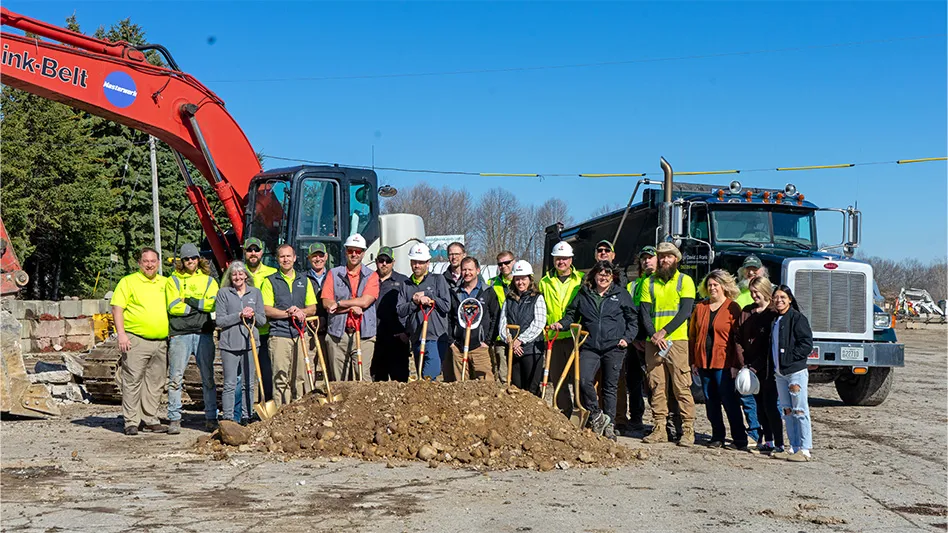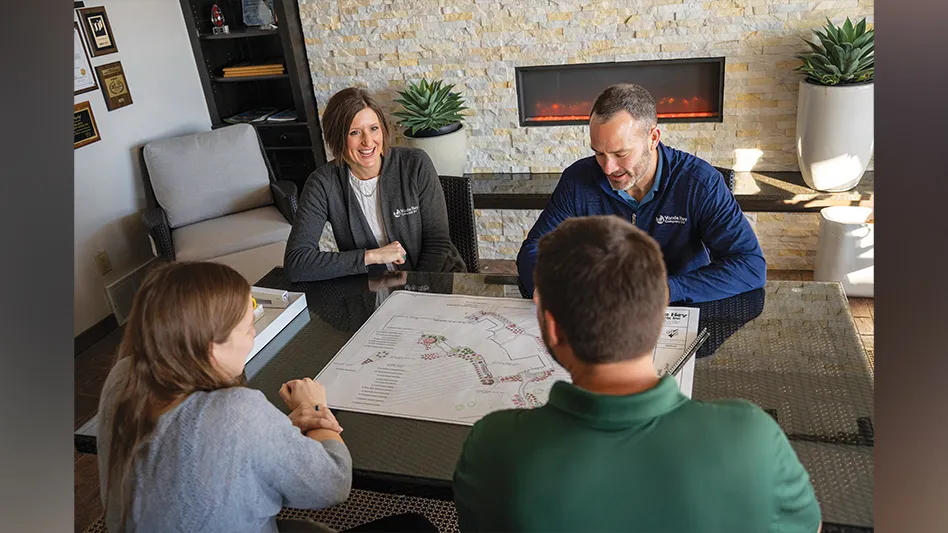Peter Donovan clearly recalls a conversation eight years ago that sent his systems for a loop and spun his business in a 180-degree turn for the better.
|
|
“My friend, who owns a nursery, asked me, ‘How much will it cost you to open your doors tomorrow morning?’” said the president of Earthworks Landscaping, Wakefield, Mass. “I looked at him with six heads,” he laughed. “Then he said to me, ‘Don’t go out into the field until you know.’”
Donovan and his wife, Linda, who serves as vice president and runs office administrative operations, collected every receipt and the two sat down for a three-day number-crunching powwow, adding each cost and figuring overhead expenses.
Still, Donovan is flabbergasted by his blank stare to a question so crucial to running an efficient, profit-bearing business, but as illustrated by the company’s 40-percent revenue growth last year, things have changed since. The difference? Now, Donovan can tell you that each hour costs him exactly $36.25 – and his customers are paying for a mulch application instead of vice-versa. “We were getting raked over the coals,” Donovan remarked. “The bottom line is, know your numbers. What does it cost you to be in business? If you don’t know, how do you know if you’re making money?”
This mantra held steadfast – and it will drive the changes at Earthworks this year, as it hopes to push up profits 40 percent. This number sounds a bit high, perhaps, but Donovan considers it conservative. The company’s $340,000 revenue last year grew from $240,000 the year before, the extra dollars stemming from a hardscape division that started mid-season. And, with hardscape jobs booked through spring, Peter’s brother, Charlie, managing the fertilization department full-time, and new systems to cut overtime, spread the company name and sell add-ons to existing clients, Donovan is confident this year will be the “best numbers year yet.”
THE ROUGH DRAFT. Donovan wasn’t always so optimistic about the future for Earthworks. In 1998, Linda reminded Peter that he wasn’t sure the business would support their family – with “three under three,” as Linda describes their children. “We needed to set goals and priorities, but we had no clue where to go,” she said.
Donovan went to New England Grows, a conference and tradeshow in Boston, Mass., and he came home with new ideas and fresh perspective. “I had friends in similar businesses and they went big-time,” he said. “They were buying nicer houses and they had nicer cars, and I’m going, ‘You know, what’s the deal here?’”
Peter realized he needed more manpower than just him, Linda and his maintenance manager, Anthony Rigione. He hired additional employees and trained them to maintain his accounts, which largely are high-end residential homes in his Boston suburb, which is infected with the same urban sprawl many U.S. cities see today. New construction opportunities built up his client list and offering more services to his key accounts kept them coming back. “Don’t go out and look for new business when you already have a client base that knows you, knows your work and trusts you,” Linda emphasized, noting that 98 percent of clients purchase multiple services. “Ask for their business.”
This principle explains Earthworks’ service mix: 50 percent maintenance, 30 percent installation and 20 percent lawn care. Three two-man crews handle jobs, and 75 percent of employees are cross-trained. Donovan expects to hire two more employees this season, however, to keep up with the company’s growth, and he is also looking for someone to manage the hardscape department, which is his primary concentration at this point.
While Donovan allots most of his field time to installation projects, his brother, Charlie, will increase his duties at Earthworks to become the full-time fertilization manager in the spring. This will tap into another profit center for the company, Donovan noted.
ONGOING REVISIONS. Meanwhile, Linda manages the administrative flurry in their home office – a colonial situated on commercial property with a two-room office extension and a back yard that houses three storage areas and a fenced in section for their three service trucks. Earthworks and the Donovan residence are one in the same, and Linda says their clients appreciate and relate to the down-to-earth office setting.
“Seventy percent of the time it’s a stay-at-home mom calling you, and when I say, ‘I’m Peter’s wife,’ you have no idea how valuable that is,” she explained. “For them, it’s a personal touch, and they think, ‘This woman is doing what I’m doing.’”
This human connection defines many of Linda’s projects as she strives to make a name for Earthworks with creative marketing ideas – bibs for children that say “We dig Earthworks Landscaping” and thank-you cards with bagsof seed for clients who request estimates, even if they don’t choose to purchase the services. A newsletter is in the works and the company rewards clients for referrals with free fertilizer applications and gift certificates for dinners with their families. “That’s my baby now,” she said of these recent incentive additions. “I want our name to get out there.”
While Linda concentrates on these developments and bookkeeping, she relies more on their accountant for financial advice and has trusted another accountant with the checkbook. “When you’re running the kind of money in and out every day that we do, you need help,” she said simply.
Donovan agrees. Asking for assistance will keep the business focused. “Peter cannot be everywhere every time and have knowledge in every field,” Linda piped in.
This is why “educated delegation” will be a large part of Earthworks’ future, Donovan noted. As he passes off key responsibilities in the hardscape division and lets Charlie handle fertilization, he will concentrate on tweaking inefficiencies, like timing, cutting down man-hours and implementing an incentive program.
Already, the company has whittled last year’s 55- to 60-hour workweek down to 40 to 45 hours. Crews know they have a schedule to stick to, and finishing it in fewer hours means more free time. “Last year was our biggest growth year, but also our biggest payroll and overtime year,” Donovan said. “If I could have controlled our overtime – that really shot our net full of holes.”
Already, the company notices less burn-out among employees and has increased efficiency on jobs.
Also, Donovan is sticking to the clock when timing jobs so he can accurately estimate project man-hours. No more guesswork, no more wasted hours spent loading trucks or stopping between jobs. “Right now, we’re timing each job,” he noted, stressing the specificity of his records. “We go there at 8:07 a.m. and we leave at 12:08 p.m. – we have more detail to our [labor tracking] and we’re getting it down to the minute to know exactly to the penny how much we spent on the job.”
Donovan knows tackling these operational adjustments will take more than a three-day workshop, but he’s heading into growth with numbers in mind.
“Right now, there is only so much one company can handle at once,” Donovan admitted, realizing the weight of his own words – the challenges that come with carrying out his hefty to-do list. “Earthworks isn’t at 100-percent efficiency, but it’s three-quarters of the way there.”
The author is Managing Editor – Special Projects for Lawn & Landscape magazine and can be reached at khampshire@lawnandlandscape.com.

Explore the June 2002 Issue
Check out more from this issue and find you next story to read.
Latest from Lawn & Landscape
- Landscape Workshop acquires Cut Above Enterprises
- Scythe debuts new generation of M.52
- New identities
- Ruppert promotes Anderson to director of talent acquisition
- Fleet on the Street
- Man in the mirror
- EverSmith Brands appoints Ken Hutcheson as its new CEO
- Manitou unveils new Woodcracker tree saw with grapple






